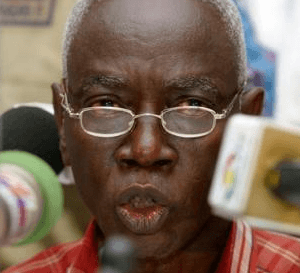Election observation is not a fault-finding mission – Dr Afari-Gyan

Dr Kwadwo Afari-Gyan, a former Chairman of the Electoral Commission, has cautioned election observers to be mindful of the fact that election observation is not a fault-finding mission but a fact-finding activity.
He said a neutral stance facilitated collaboration between observer groups and election management bodies (EMBs) for the common purpose of achieving genuine democratic elections.
Dr Afari-Gyan gave the caution on Tuesday in his presentation at the West Africa Election Observers Network (WAEON) Conference in Accra.
The two-day Conference, on the theme: “The Increasing Role of Technology in Election Administration: Implications for Election Observer Groups,” is being organised by WAEON, in collaboration with the Centre for Democratic Development Ghana.
The Conference, which is being attended by more than 40 participants drawn from across Africa, seeks to bring together citizens, election observer groups and other electoral stakeholders in the West-African Sub-region to deliberate on emerging issues from technology driven elections and election observation.
Dr Afari-Gyan said the issue raised by election observer groups on limited access to technology systems of EMBs would differ from country to country depending on whether the relationship between the observer group and the EMB was cooperative or adversarial.
This would also depend on the kind of information about the EMBs technology system that the observer group wanted.
Dr Afari-Gyan said irrespective of the degree of access to an EMBs technology system during an election, party agents, observers, and the media could still scrutinize the operational aspects of the system by finding out how user-friendly the technology was to officials and voters and how efficient it was in the delivery of the vote.
He noted that one could have the best election technology available and still not be able to deliver a credible election; adding: “This underscores the singular importance of the human factor in elections”.
“Technology is used to assist election officials to do their work. So, beyond technology, an EMB has a responsibility to put its house in order for elections,” he said.
He said at the minimum, EMBs must build checks into the electoral process, such that genuine mistakes and deliberate wrongdoing could be detected.
Dr Afari-Gyan said EMBs must also train all categories of election officials well to be able to deliver services in a transparent and efficient manner, stating that “where election officials are ill-prepared, biased, or corrupt, technology cannot be used to achieve credible elections.”
The former Electoral Commissioner said the human factor that impinged on the delivery of genuine elections was not to be found only in the EMB, citing that the unwillingness of political parties to exhibit democratic behaviour and play by the laid down rules was a huge and negative factor in elections.
Dr Franklin Oduro, the Project Manager and Head of WAEON Secretariat, underscored the significant role EMBs played in deepening democratic process on the African Continent.
Mr James Lahai, the Acting Chairperson, WAEON Executive Council, called for the re-examination of the role of technology in the electoral process.
Mr Francis Oke, the Head of ECOWAS Electoral Assistance Division, lauded Dr Afari-Gyan for playing a pioneering role in Africa’s electoral management process.
WAEON is an independent, non-partisan and non-religious organisation that aims at strengthening and supporting Citizen Election Observation Groups in West Africa.
Source: GNA
